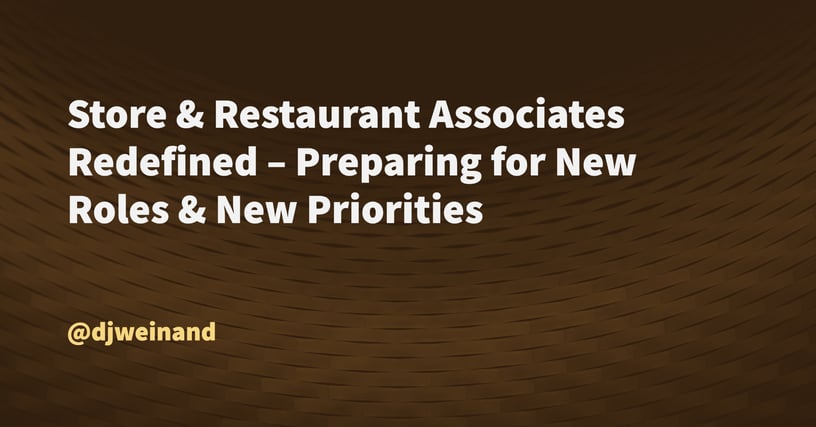In this blog, learn from leaders at Axsium and RSPA the steps required to retrain, rehire and retain the best associates.

Featured in This Exclusive Fireside Chat
![]() Dave. How do you see the roles of associates changing as the economy re-opens?
Dave. How do you see the roles of associates changing as the economy re-opens?
![]() Jim. I think the role of associates is going to change but I don't think it's going to be a complete 180-degree turn from the job that they had earlier in 2020. What will change is that they must be much more mindful of the mindset of their customer. There is currently a wide spectrum of behavior, from apprehension about being in a public environment interacting with others to those feeling completely invincible. I think it's going to be up to the associate to read that and to respond appropriately.
Jim. I think the role of associates is going to change but I don't think it's going to be a complete 180-degree turn from the job that they had earlier in 2020. What will change is that they must be much more mindful of the mindset of their customer. There is currently a wide spectrum of behavior, from apprehension about being in a public environment interacting with others to those feeling completely invincible. I think it's going to be up to the associate to read that and to respond appropriately.
Before it was more of a transactional relationship where associates had to make the customer feel welcome or elevated but now there's the extra responsibility of reading the customer and reacting. In addition, the associate has to feel protected and safe and if they do so, they will be able to instill that confidence in a safe environment in the consumer as well.
![]() Bob. The associate will continue to be the ultimate brand representative, the caretaker of the customer experience, and the conduit for commerce in your store. However, the work required of the associates in the store to accomplish these goals is going to change quite a bit.
Bob. The associate will continue to be the ultimate brand representative, the caretaker of the customer experience, and the conduit for commerce in your store. However, the work required of the associates in the store to accomplish these goals is going to change quite a bit.
Before COVID-19 a lot of retailers had introduced omnichannel activities like ship from store and buy online and pick up in the store but this represented a relatively small amount of the associates' actual activity on any given day. The pandemic has changed all of that because it's really changed the consumer's expectation of what they want.
These types of fulfillment activities are going to increase exponentially and processes for each are quite different. Fulfilling an online order to ship will be quite different than fulfilling an online order for curbside pickup.
Outside of commerce activities, We also need to think about health and safety activities. Social distancing has created the 'greeter' role that allows us to count people as they come in and out of the store. We're going to see more cleaning activities and then of course recovery. Associates will have entirely new processes for dealing with returns or used on-floor merchandise and ensuring it can be sterilized or sanitized before it gets returned to the floor.
----
![]() Dave. What challenges do you see with finding and retaining associates?
Dave. What challenges do you see with finding and retaining associates?
![]() Jim. First, from a retention standpoint, many of a retailer's former workers won't be available for a variety of reasons. Habits change, life situations change.
Jim. First, from a retention standpoint, many of a retailer's former workers won't be available for a variety of reasons. Habits change, life situations change.
I equate it to say, the NFL. If every player was made a free agent at the end of the season, that opportunity to look around and shop the market would mean that many of them would go elsewhere. The same holds true for associates in this instance.
As far as finding the right people, I think that is going to be even a bigger challenge from a hiring standpoint. With the challenges retailers and restaurants are facing; from opening procedures, financial constraints, and their own understaffing at the executive ranks, finding the right associates is going to be very difficult. I predict initially that rather than holding out for the 'right people' they are going to lower standards somewhat to get associates in the door.
Right now I think it's critical to control what you can and focus on three things to attract the best employees:
- Have a thorough, rigorous interview process
- Ensure pay is equal to, if not above, other retailers and restaurant
- Culture, culture, culture. Make associates feel like they are valued and offer incentives outside of pay to ensure they stick around.
![]() Bob. I think there are three primary challenges we're going to see.
Bob. I think there are three primary challenges we're going to see.
- First, it's simply unemployment insurance. Right now because of the benefits that associates get from staying at home it's incentivizing people to not come back to work.
- Second, it comes down to fear. People are worried about their health and they worry about what it means to come back to work and come back to a very social setting like the store.
- The third is that the workplace is extremely competitive right now. There are other retailers like grocers that have offered things like incentive pay to come and work for them. Therefore, it's going to be very difficult to attract workers to come back to your store, and you're going have to become very creative to be able to keep people.
----
![]() Dave. How can technology better enable associate safety and help associates provide a better guest experience?
Dave. How can technology better enable associate safety and help associates provide a better guest experience?
![]() Jim. If you have seen the movie Contagion, the pandemic movie that came out several years ago, you likely won't touch a doorknob with your bare hands for several weeks because you're just very concerned that it is dirty!
Jim. If you have seen the movie Contagion, the pandemic movie that came out several years ago, you likely won't touch a doorknob with your bare hands for several weeks because you're just very concerned that it is dirty!
If technology can help provide the consumer with some confidence in the environment they are in, I think that's going to make a big difference. Competence leads to confidence, so if you see an associate behaving in a competent, high-tech environment rather than a low-tech environment,, I think that is kind of the overarching role that technology can play.
I see this on a spectrum. At the most basic level, solution providers in technology should be training associates on how to properly clean their equipment and those directions should be posted prominently so the consumer can see that they're taking this seriously and have faith when touching the payment device, etc.
Moving up the spectrum are things like contactless payments and social distancing software. Several of our members have stated unprecedented levels of interest in these types of solutions. If the consumer understands that this type of technology exists in the store, they will feel more confident in the environment that they're walking into.
Finally, we're seeing digital signage play an increasingly important role in the new environment. Displaying clear, concise safety guidelines on glossy digital signage vs. low-tech options like tape or stickers that can get quickly damaged or destroyed, can instill a greater degree of confidence at the consumer and associate level.
![]() Bob. I think one of the biggest things that are going to have an impact on health and safety from a technology perspective is the mobile phone. It was important for the consumer's experience before COVID-19 but as we move through the pandemic, I believe the mobile phone is critical for health and safety from both the customer and the associate's perspective.
Bob. I think one of the biggest things that are going to have an impact on health and safety from a technology perspective is the mobile phone. It was important for the consumer's experience before COVID-19 but as we move through the pandemic, I believe the mobile phone is critical for health and safety from both the customer and the associate's perspective.
From an associate's perspective, the mobile will reduce the use of shared equipment in the stores. Currently, the point of sale terminal by itself is something that is used by all of the associates in the store. By moving to a mobile device, even if it's one that's provided by the store during the shift, you can disinfect that device and then use it for multiple tasks. It also reduces the use of other shared devices, like the time clock for example.
I also believe we're going to see traffic counters become repurposed to understand what the capacity of the store is and tell us how many more people can come and go out and provide automated alerts to consumer's and associate's phones to let them know when it's safe to allow more people in.
Finally, I see automation and robotics playing an increasingly important role and this will affect associates. The economics of the store has changed dramatically and they will likely be permanent so retailers are going to need to look at how to balance labor costs with commerce revenue that comes into the store. Automation will play a big role in that equation.
About the speakers:

Jim Roddy
Jim is a 10+ year veteran at RSPA and author of ‘Hire Like You Just Beat Cancer.’
Bob Clements
Bob has spent 20+ years in workforce management and is currently CEO of Axsium, a WFM Consultancy.To view this or the four other blogs in video form please visit:
Reopening the Doors to Retail and Restaurants: Five Topics to Consider


 Jim Roddy
Jim Roddy 
 Bob Clements
Bob Clements  Dave Weinand
Dave Weinand 

